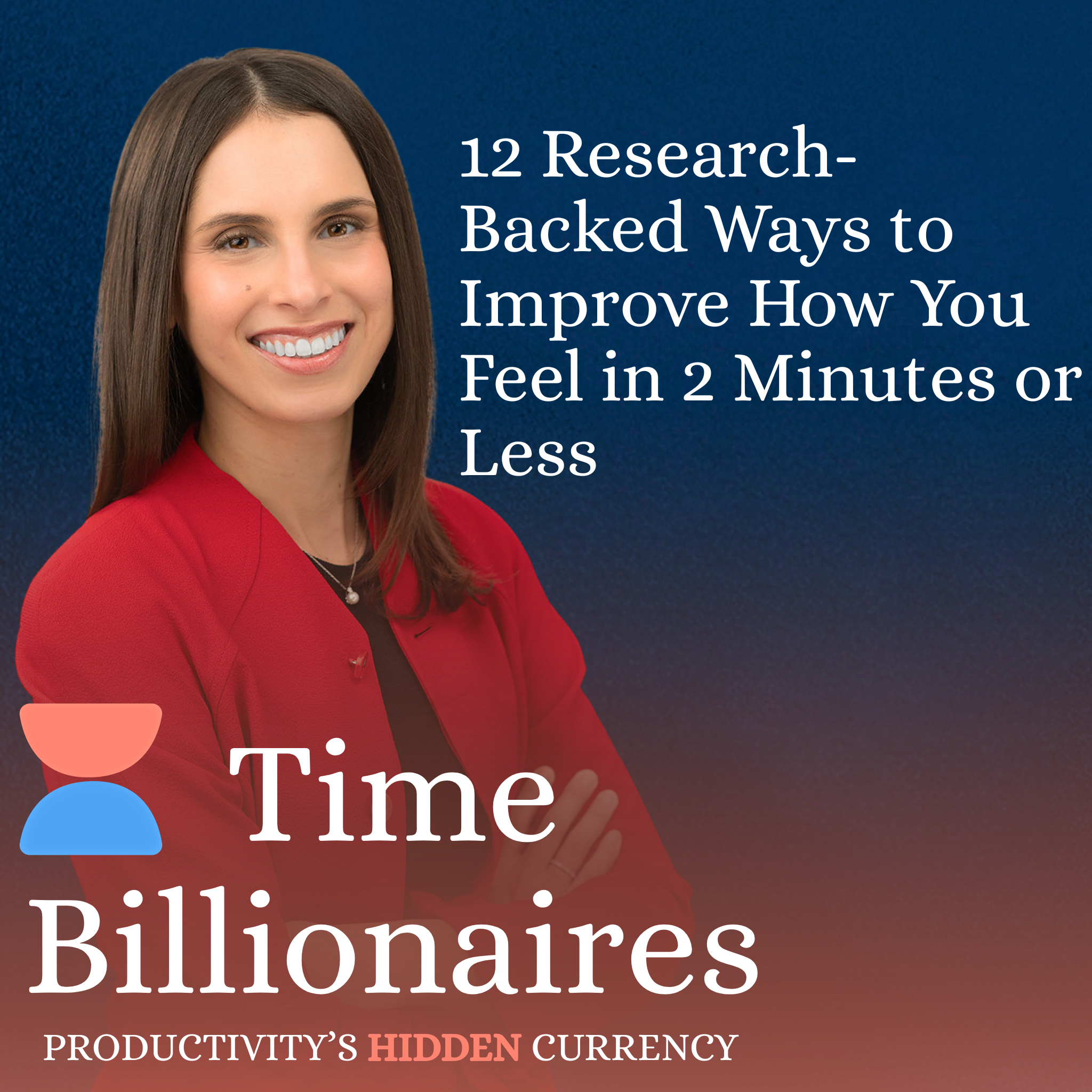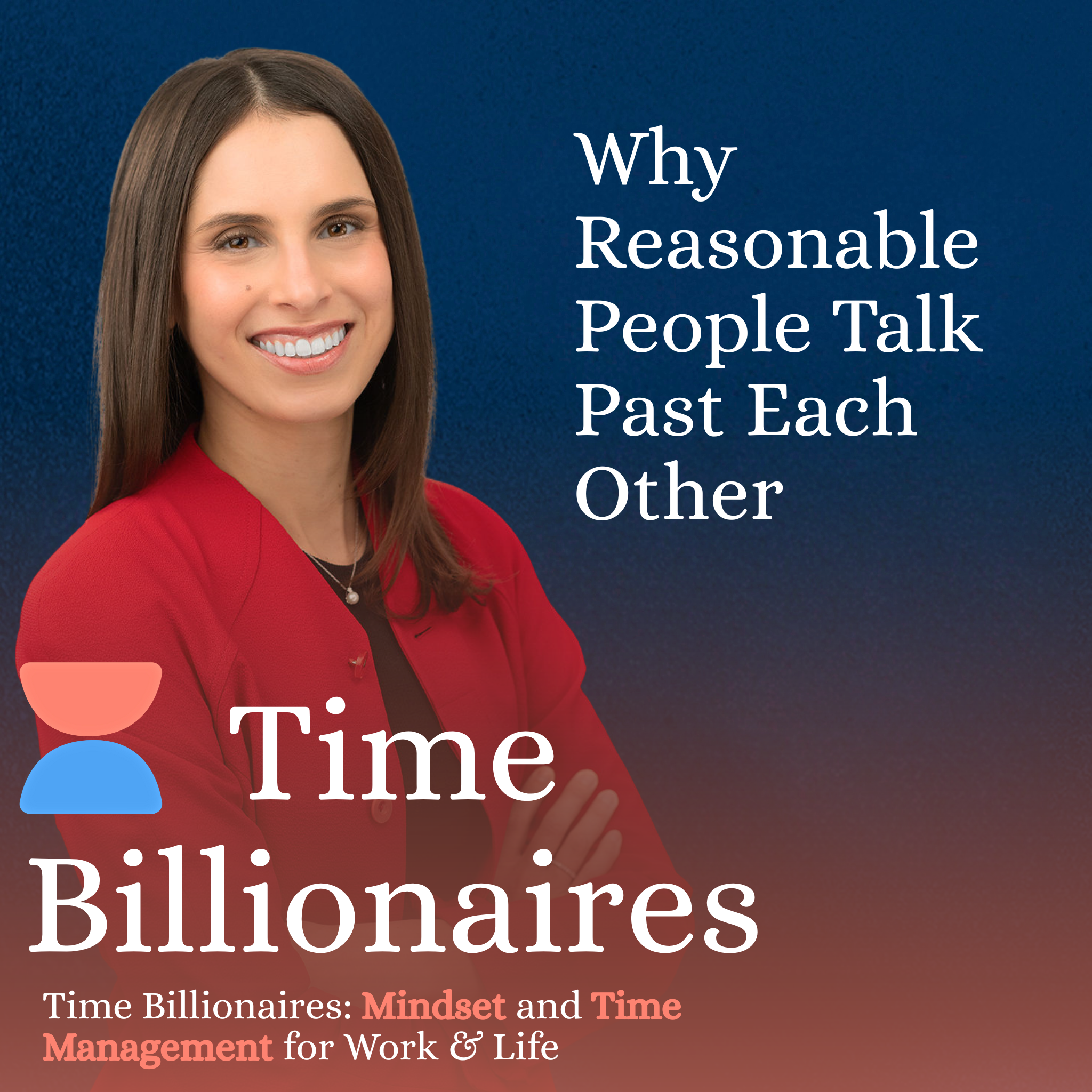Episode Transcript
[00:00:00] Speaker A: Wanting beautiful things for yourself doesn't take them away from anyone else. There is enough ambition and joy to go around. True fulfillment doesn't always feel pleasant in real time, but it's the kind of satisfaction that lasts hey there billionaire.
[00:00:14] Speaker B: Yep, I'm talking to you. If you expect to live another 31 years, you're already a billionaire. Not in money, but in the real.
[00:00:21] Speaker A: Measure of wealth, time.
[00:00:24] Speaker B: That's because 31 years is roughly a billion seconds. But most of us waste time in ways we'd never waste money. The currency of time billionaires billionaires is micro moments, the 90 second to 15 minute gaps hidden between the structured parts of your day. This podcast is about reclaiming them with quick, research backed ideas to help you feel more creative, productive and alive. Welcome to Time Billionaires. Let's make your next micro moment count.
[00:00:57] Speaker A: Why do we feel guilty for wanting things? And how can we tell the difference between what makes us happy and what just makes us feel good for a moment A few years ago, I caught myself doing something that seemed completely normal to me at the time, but now feels strange. I was sitting in a meeting listening to a colleague take credit for a project that I had come up with and done most of the work for. But instead of speaking up about it, I stayed quiet. Not because I didn't have things to contribute, but because an old voice in my head whispered, be the bigger person. Don't make this about you. You're lucky to be on this team. At the time, I traced that thinking back to something that I'd once overheard a manager say about a peer of hers calling the other person really good at promoting herself in a tone that was clearly not a compliment. But I realize now that I've been carrying versions of that message my entire life. In school, at work, and in friendships, I seem to just have this message of don't seek attention, be a team player. Don't ask too much, don't stand out too much.
From a young age, I think a lot of us were taught not to take up too much space, not to be bragging or bossy, and that sounding greedy would alienate our friends. And depending on how we were raised, that lesson sometimes went even further, suggesting that shrinking our desires somehow made us more virtuous. Being satisfied with good enough was somehow making us good people, and that ambition, pleasure, and wanting more were somehow selfish.
But reading the book Sapiens by Yuval Noah Harari helped me realize that this belief that achieving our goals or acquiring things that make us happy is a zero sum game stems from Our hunter gatherer roots. And it's outdated. When we're hunter gatherers, someone else getting food means that you can't have it. But nowadays there is no zero sum game between our goals.
I think a lot of us have internalized, explicitly or not, that expressing our wants isn't socially acceptable and that we should pretend to want less or to like things that we don't, or to not want things that we do.
And for a lot of us, especially women, those lessons tend to go even further. Be accommodating. Be humble. Anticipate other people's needs. Don't make other people uncomfortable by standing out or with the size of your dreams. But I've come to really appreciate that wanting is human and desire is what keeps us curious and growing. And it's how we stretch toward possibility.
Not because we're ungrateful for what we have, but because we're wired to expand.
But somewhere along the way, I started confusing contentment with complacency and. And humility Started becoming this all consuming self erasure.
Wanting more of anything, whether it's freedom, rest, success. Beauty doesn't make you materialistic. It makes you honest about what makes you happy.
And yet, even knowing that, I think a lot of us still struggle to own what we want. And I certainly did. We settle for small comforts instead, like little rewards that make us feel good for a moment, even if they keep us stuck in place. They're essentially consolation prizes for settling for a life that doesn't fulfill us.
Wanting beautiful things for yourself doesn't take them away from anyone else. There is enough ambition and joy to go around.
So when we're honest about what actually makes us happy, we expand what's possible.
Not just for ourselves, but for the people around us.
Whether it's wanting a better job, an indulgent hobby, or a little luxury. Desire isn't selfish. It's what keeps us moving, growing and alive.
When you hear the word happiness, it's often associated with the ephemeral version of instant gratification. Those small hits of dopamine and pleasure. It could be a good meal, a shopping spree, or checking social media for likes. But I've learned the hard way that chasing those fleeting pleasures often comes at the cost of deeper, more meaningful fulfillment.
Early in my career, I was dedicated to doing everything by the book. I didn't push for promotion. I didn't ask for what I really wanted. I just kept my head down, worked really hard, and thought that eventually someone would recognize my worth. And that making my boss look good was really what my job was.
But I realized that that good girl conditioning of not asking for more, not advocating for myself left me propping up other people while I was the one feeling drained and unfulfilled. There's even a subtle ego to that kind of self denial. I've come to realize that convincing myself that I didn't need what others wanted somehow made me above it because I was so satisfied and virtuous and just giving to the greater cause. But that really isn't virtue, it's avoidance. And that's how I ended up stuck in a cycle of short term comfort at the expense of long term happiness and chasing those easy wins, quick validations and ignoring the bigger picture.
The research backs this up. In psychology we talk about two different types of happiness. Hedonic happiness is that pleasure seeking, instant gratification kind the desserts, vacations, social media likes things that are fun in the moment.
But eudaimonic happiness is the deeper, longer lasting fulfillment that comes from living authentically, pursuing meaningful goals, and growing as a person really having the impact that we want to be.
Dr. Sonia Lubomirsky, a professor at UC Riverside and one of the foremost researchers in happiness science, found that while hedonic happiness feels great in the moment, it doesn't lead to sustained well being. True long term happiness and fulfillment comes from meaningful pursuits, even those that require discomfort and delayed gratification. The key is balance between the two types. Wanting pleasure in the moment isn't bad, it just isn't enough. And sacrificing all pleasure in the moment for the sake of long term delayed gratification isn't a recipe for happiness either.
The fulfillment that we get from growth, challenge and aligning our desires with our deeper values is what truly sustains us.
But we often get stuck overvaluing short term satisfaction and undervaluing long term fulfillment.
It's easy to think that happiness lives in those small pleasures, the scroll, the snack, the glass of wine.
But those aren't the moments that your soul is probably really craving, and they might just be masking a deeper hunger for meaning or progress.
The most fulfilling experiences often don't feel good in the moment.
Workouts that you don't want to do but leave you feeling energized afterward, hard conversations that bring you closer to somebody, or a project that demands late nights but gives you a sense of purpose when it's done. True fulfillment doesn't always feel pleasant in real time, but it's the kind of satisfaction that lasts.
Here are three quick exercises to help you balance short term satisfaction with long term fulfillment AKA both types of happiness.
The first one is called the non dominant hand Free write and it takes just two minutes.
Set a timer for two minutes and write with your non dominant hand. You're not going to edit or overthink it, just move the pen and see what happens.
When you slow your brain down like this, you start bypassing the logic and planning layer and access a different layer of awareness.
You may be surprised what shows up when you stop trying to control the outcome or move so quickly.
The second one is called the unfinished thought and it takes just three minutes.
Open up a blank page. It can be by hand or the notes doc on your phone and start a sentence with the words I wish or if only and then keep writing until the timer goes off.
The goal isn't to finish this thought, it's to catch the hidden desires underneath your daily to do list.
You may be surprised what your brain reveals that you didn't expect, you actually wanted. And if you find yourself going back and ruminating I wish something was different as opposed to thinking about a desire in the future that could be a clue about where you put most of your energy. Ruminating versus Planning and the last one is called the Eudaimonic Reframe.
Think of a task you've been avoiding because it feels uncomfortable or tedious and now ask yourself how will I feel after I've done it? When you visualize the long term benefit of pride, relief or progress, you can use that feeling as your motivation to get started. So here's your micro moment invitation today. When you're tempted to reach for an easy dopamine, hit a scroll, A snack? A quick distraction? Just take a deep breath for a second and then ask yourself what you're really craving. Is it comfort in that moment to relax and pause? Or do you need growth to get out of some kind of funk that's keeping you stuck?
Because the five minutes you spend pursuing what's meaningful instead of what's easy can quietly rewire your brain and change how you wake up tomorrow.
[00:09:11] Speaker B: Thanks for spending this micro moment with me.
[00:09:13] Speaker A: If you found it valuable, share it.
[00:09:15] Speaker B: With a fellow time billionaire and give us a rating to help others discover the power of micro moments. For more ways to reclaim your time, check out timebillionaires.org and follow me. Rebecca Shattucks on LinkedIn. See you next time.


